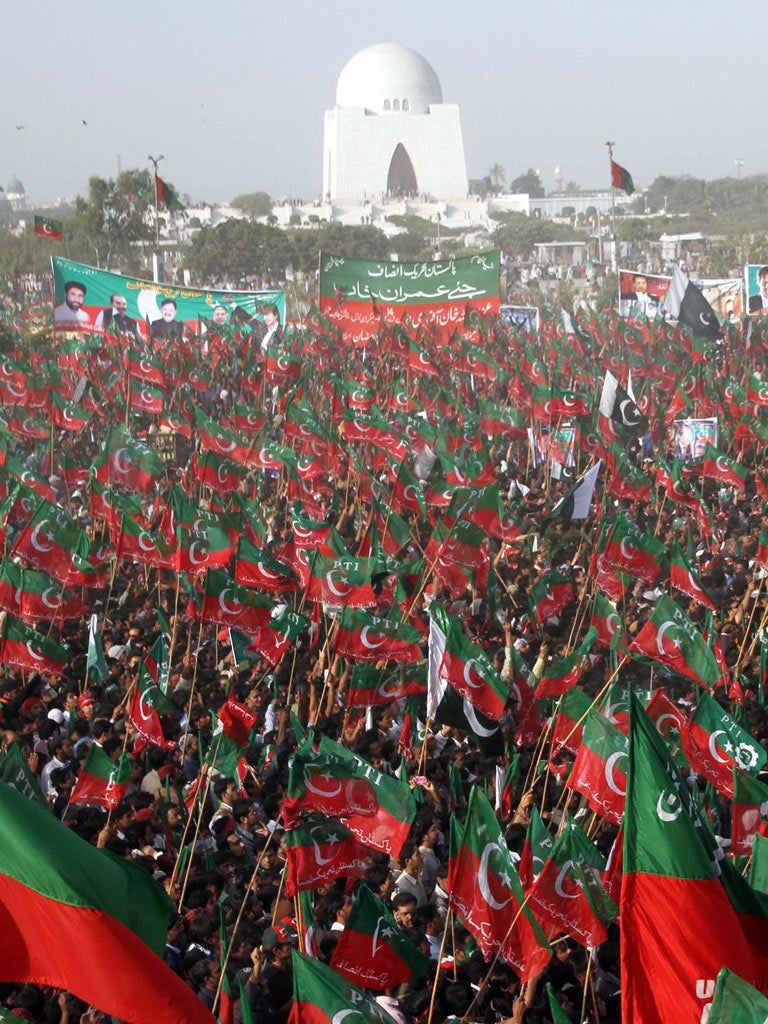
Your support helps us to tell the story
From reproductive rights to climate change to Big Tech, The Independent is on the ground when the story is developing. Whether it's investigating the financials of Elon Musk's pro-Trump PAC or producing our latest documentary, 'The A Word', which shines a light on the American women fighting for reproductive rights, we know how important it is to parse out the facts from the messaging.
At such a critical moment in US history, we need reporters on the ground. Your donation allows us to keep sending journalists to speak to both sides of the story.
The Independent is trusted by Americans across the entire political spectrum. And unlike many other quality news outlets, we choose not to lock Americans out of our reporting and analysis with paywalls. We believe quality journalism should be available to everyone, paid for by those who can afford it.
Your support makes all the difference.More than 100,000 people rallied in support of Pakistani cricket legend and opposition politician Imran Khan in the southern city of Karachi yesterday, further cementing his status as a rising force in politics.
His message of cracking down on corruption and standing up to the US has found new resonance at a time when Pakistanis are fed up with the country's chronic insecurity and economic malaise.
Khan, 59, is riding a wave of dissatisfaction with the government of President Asif Ali Zardari, who co-chairs the ruling Pakistan People's Party (PPP), and is facing challenges from the military, the supreme court and political opponents after a year of cascading crises.
Police estimated the rally had been attended by between 100,000 and 150,000 people. Khan's Pakistan Tehreek-i-Insaaf (PTI), or Pakistan Movement for Justice, estimated the crowd at more than 500,000.
Even at the lower estimate, it is among the largest political rallies held in Karachi in recent years.
Khan, in a rousing speech punctuated with patriotic musical refrains, pledged, if elected, to curb Pakistan's endemic corruption.
"We need a government that changes the system and ends corruption, so we need the PTI to come to power," Khan told the crowd. "The first thing we need to do is end corruption."
"I promise we will end big corruption in 90 days," he added.
Khan's massive rally comes at a time of crisis in Pakistani politics. Tensions are rising between Pakistan's civilian leaders and its generals over a memo that accused the army of plotting a coup after the US raid that killed Osama bin Laden in May.
There are signs that Pakistan's powerful army is fed up with Zardari and wants the supreme court or early elections to force him from office. The army chief dismissed any rumours of a coup, however, as "speculation".
Several recent polls have shown Khan is Pakistan's most popular politician. He is especially favoured in urban areas.
"He is riding a wave of popular politics right now," said Mutahir Ahmed, a professor of International Relations at the University of Karachi. "There is a lot of frustration among ordinary people, as well as political workers right now, which he is cashing on."
"He has ... managed to bring people out on the roads, and this is a big achievement, especially in Karachi, where three months back people were not ready to come out of their houses because of rampant violence and killings," Ahmed said.
But popularity doesn't always translate into political power. The majority of Pakistan's voters are rural, where feudal relationships determine generations of political loyalty.
Khan, for all the enthusiasm shown for him among young people and the urban middle class, has yet to demonstrate the party machinery that the PPP and the Pakistan Muslim League-N faction have had decades to perfect.
In the last 15 years, the PTI has only briefly held one seat in parliament - Khan's. Most analysts say Khan could score an upset of 20 to 30 seats in parliament, but that's not enough to give him the premiership. It is enough to make him a major political player, however - or even a kingmaker.
"It's too premature to get into speculation of whether he becomes prime minister or not but the chances of his party getting into parliament look very good," said security analyst Imtiaz Gul.
He also has a touchy relationship with the United States, Pakistan's ally and aid donor.
He says that if elected prime minister, he would end cooperation in the fight against militants based in tribal areas, end the covert campaign of bombings by US drones and refuse all US aid, which totals some $20 billion since 2001.
Relations with the United States have reached a crisis point because of a Nov 26 cross-border incident in which NATO aircraft killed 24 Pakistani troops. Pakistan has since shut down NATO supply routes into Afghanistan and demanded an apology.
REUTERS
Join our commenting forum
Join thought-provoking conversations, follow other Independent readers and see their replies
Comments